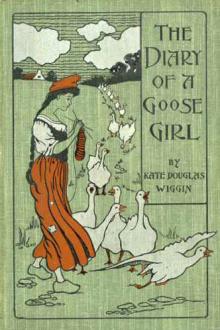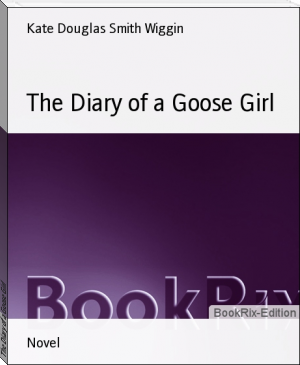The Diary of a Goose Girl - Kate Douglas Smith Wiggin (top android ebook reader .TXT) 📗

- Author: Kate Douglas Smith Wiggin
- Performer: -
Book online «The Diary of a Goose Girl - Kate Douglas Smith Wiggin (top android ebook reader .TXT) 📗». Author Kate Douglas Smith Wiggin
We have a new brood of seventeen ducklings just hatched this afternoon. When we came to the nest the yellow and brown bunches of down and fluff were peeping out from under the hen’s wings in the prettiest fashion in the world.
“It’s a noble hen!” I said to Phœbe.
“She ain’t so nowble as she looks,” Phœbe answered grimly. “It was another ’en that brooded these eggs for near on three weeks and then this big one come along with a fancy she’d like a family ’erself if she could steal one without too much trouble; so she drove the rightful ’en off the nest, finished up the last few days, and ’ere she is in possession of the ducklings!”
“Why don’t you take them away from her and give them back to the first hen, who did most of the work?” I asked, with some spirit.
“Like as not she wouldn’t tyke them now,” said Phœbe, as she lifted the hen off the broken egg-shells and moved her gently into a clean box, on a bed of fresh hay. We put food and drink within reach of the family, and very proud and handsome that highway robber of a hen looked, as she stretched her wings over the seventeen easily-earned ducklings.
Going back to the old nesting-box, I found one egg forgotten among the shells. It was still warm, and I took it up to run across the field with it to Phœbe. It was heavy, and the carrying of it was a queer sensation, inasmuch as it squirmed and “yipped” vociferously in transit, threatening so unmistakably to hatch in my hand that I was decidedly nervous. The intrepid little youngster burst his shell as he touched Phœbe’s apron, and has become the strongest and handsomest of the brood.
All this tending of downy young things, this feeding and putting to bed, this petting and nursing and rearing, is such pretty, comforting woman’s work. I am sure Phœbe will make a better wife to the carrier for having been a poultry-maid, and though good enough for most practical purposes when I came here, I am an infinitely better woman now. I am afraid I was not particularly nice the last few days at the Hydro. Such a lot of dull, prosy, inquisitive, bothering old tabbies! Aunt Margaret furnishing imaginary symptoms enough to keep a fond husband and two trained nurses distracted; a man I had never encouraged in my life coming to stay in the neighbourhood and turning up daily for rejection; another man taking rooms at the very hotel with the avowed purpose of making my life a burden; and on the heels of both, a widow of thirty-five in full chase! Small wonder I thought it more dignified to retire than to compete, and so I did.
I need not, however, have cut the threads that bound me to Oxenbridge with such particularly sharp scissors, nor given them such a vicious snap; for, so far as I can observe, the little world of which I imagined myself the sun continues to revolve, and, probably, about some other centre. I can well imagine who has taken up that delightful but somewhat exposed and responsible position—it would be just like her!
Threatened . . . to hatch in my hand
I am perfectly happy where I am; it is not that; but it seems so strange that they can be perfectly happy without me, after all that they—after all that was said on the subject not many days ago. Nothing turns out as one expects. There have been no hot pursuits, no rewards offered, no bills posted, no printed placards issued describing the beauty and charms of a young person who supposed herself the cynosure of every eye. Heigh-ho! What does it matter, after all? One can always be a Goose Girl!
* * * * *
I wonder if the hen mother is quite, quite satisfied with her ducklings! Do you suppose the fact of hatching and brooding them breaks down all the sense of difference? Does she not sometimes reflect that if her children were the ordinary sort, and not these changelings, she would be enjoying certain pretty little attentions dear to a mother’s heart? The chicks would be pecking the food off her broad beak with their tiny ones, and jumping on her back to slide down her glossy feathers. They would be far nicer to cuddle, too, so small and graceful and light; the changelings are a trifle solid and brawny. And personally, just as a matter of taste, would she not prefer wee, round, glancing heads, and pointed beaks, peeping from under her wings, to these teaspoon-shaped things larger than her own? I wonder!
We are training fourteen large young chickens to sit on the perches in their new house, instead of huddling together on the floor as has been their habit, because we discover rat-holes under the wire flooring occasionally, and fear that toes may be bitten. At nine o’clock Phœbe and I lift the chickens one by one, and, as it were, glue them to their perches, squawking. Three nights have we gone patiently through with this performance, but they have not learned the lesson. The ducks and geese are, however, greatly improved by the application of advanced educational methods, and the régime of perfect order and system instituted by Me begins to show results.
One can always be a Goose Girl
There is no more violent splashing and pebbling, racing, chasing, separating. The pole, indeed, still has to be produced, but at the first majestic wave of my hand they scuttle toward the shore. The geese turn to the right, cross the rickyard, and go to their pen; the May ducks turn to the left for their coops, the June ducks follow the hens to the top meadow, and even the idiot gosling has an inspiration now and then and stumbles on his own habitation.
The geese . . . cross the rickyard
Mrs. Heaven has no reverence for the principles of Comenius, Pestalozzi, or Herbert Spencer as applied to poultry, and when the ducks and geese came out of the pond badly the other night and went waddling and tumbling and hissing all over creation, did not approve of my sending them back into the pond to start afresh.
“I consider it a great waste of time, of good time, miss,” she said; “and, after all, do you consider that educated poultry will be any better eating, or that it will lay more than one egg a day, miss?”
I have given the matter some attention, and I fear Mrs. Heaven is right. A duck, a goose, or a hen in which I have developed a larger brain, implanted a sense of duty, or instilled an idea of self-government, is likely, on the whole, to be leaner, not fatter. There is nothing like obeying the voice of conscience for taking the flesh off one’s bones; and, speaking of conscience, Phœbe, whose metaphysics are of the farm farmy, says that hers “felt like a hunlaid hegg for dyes” after she had jilted the postman.
As to the eggs, I am sure the birds will go on laying one a day for ’tis their nature to. Whether the product of the intelligent, conscious, logical fowl, will be as rich in quality as that of the uneducated and barbaric bird, I cannot say; but it ought at least to be equal to the Denmark egg eaten now by all Londoners; and if, perchance, left uneaten, it is certain to be a very superior wife and mother.
While we are discussing the subject of educating poultry, I confess that the case of Cannibal Ann gives me much anxiety. Twice in her short career has she been under suspicion of eating her own eggs, but Phœbe has never succeeded in catching her in flagrante delicto. That eminent detective service was reserved for me, and I have been haunted by the picture ever since. It is an awful sight to witness a hen gulp her own newly-laid fresh egg, yolk, white, shell, and all; to realise that you have fed, sheltered, chased, and occasionally run in, a being possessed of no moral sense, a being likely to set a bad example, inculcate vicious habits among her innocent sisters, and lower the standard of an entire poultry-yard. The Young Poultry Keeper’s Friend gives us no advice on this topic, and we do not know whether to treat Cannibal Ann as the victim of a disease, or as a confirmed criminal; whether to administer remedies or cut her off in the flower of her youth.
Poor little chap, . . . ’e never was a fyvorite
We have had a sad scene to-night. A chick has been ailing all day, and when we shut up the brood we found him dead in a corner.
Phœbe put him on the ground while she busied herself about the coop. The other chicks came out and walked about the dead one again and again, eyeing him curiously.
“Poor little chap!” said Phœbe. “’E’s never ’ad a mother! ’E was an incubytor chicken, and wherever I took ’im ’e was picked at. There was somethink wrong with ’im; ’e never was a fyvorite!”
I put the fluffy body into a hole in the turf, and strewed a handful of grass over him. “Sad little epitaph!” I thought. “He never was a fyvorite!”
CHAPTER VIIIJuly 13th.
I like to watch the Belgian hares eating their trifolium or pea-pods or grass; graceful, gentle things they are, crowding about Mr. Heaven, and standing prettily, not greedily, on their hind legs, to reach for the clover, their delicate nostrils and whiskers all a-quiver with excitement.
As I look out of my window in the dusk I can see one of the mothers galloping across the enclosure, the soft white lining of her tail acting as a beacon-light to the eight infant hares following her, a quaint procession of eight white spots in it glancing line. In the darkest night those baby creatures could follow their mother through grass or hedge or thicket, and she would need no warning note to show them where to flee in case of danger. “All you have to do is to follow the white night-light that I keep in the lining of my tail,” she says, when she is giving her first maternal lectures; and it seems a beneficent provision of Nature. To be sure, Mr. Heaven took his gun and went out to shoot wild rabbits to-day, and I noted that he marked them by those same self-betraying tails, as they scuttled toward their holes or leaped toward the protecting cover of the hedge; so it does not appear whether Nature is on the side of the farmer or the rabbit . . .
Mr. Heaven . . . went out to shoot wild rabbits
There is as much comedy and as much tragedy in poultry life as anywhere, and already I see rifts within lutes. We have in a cage a French gentleman partridge married to a Hungarian lady of defective sight. He paces back and forth in the pen restlessly, anything but content with the domestic fireside. One can see plainly that he is devoted to the Boulevards, and that if left to his own inclinations he would never have chosen any spouse but a thorough Parisienne.
The Hungarian lady is blind of one eye, from some stray shot, I suppose. She is melancholy at all times, and occasionally goes so far as to beat her head against the wire netting. If liberated, Mr. Heaven says that her blindness would only expose her to death at the hands of the first sportsman, and it always seems to me as if she knows this, and is ever trying to decide whether a loveless marriage is any better than the tomb.
Then, again, the great, grey gander is, for some mysterious reason, out





Comments (0)